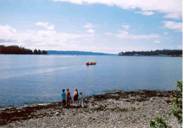



Quick Facts about Indoor Air Quality:
► On average, we spend about 90% of our day indoors, and take in over 20,000 breaths each day, meaning indoor air can have a far greater impact on our health than outdoor air.
► Most indoor air pollution is invisible, meaning we donít necessarily know itís a problem until someone in the home is affected. Indoor air pollutants are most harmful to people with asthma or respitory problems, especially in children and the elderly.
► Some of the most common indoor pollutants include pet dander, mold, dust mites, and pollens. Many people have allergic reactions to these substances, and those with asthma are particularly sensitive.
What Can You Do in Your Home?
One helpful way to learn more is to take a virtual tour of your home, with an interactive web application, found at: http://healthhouse.lungum.org/index.php
For more information on asthma, see the American Lung Associationís web site at www.alaw.org, or call them at 1-800-LUNG-USA.
Also, there are five simple things you can do to reduce pollutants in your home:
- Vacuum and clean regularly, which significantly removes the amount of dust particles that circulate in the air.
- Wipe your feet on a doormat, or better yet, take your shoes off when you enter your home. This greatly reduces the pollutants (like pesticides and heavy metals), than are tracked in from your shoes and lodged in your carpet.
- Avoid smoke from wood stoves, fireplaces, and cigarettes, all of which have toxic properties. If you have a wood stove, be sure that all the gaskets and seals are working properly, as many older stoves can ďleakĒ and emit high levels of damaging particles.
- Use less toxic products for managing pest problems in your home and garden.
- Use fans or open windows to reduce moisture in bathrooms and kitchens. This air flow helps to reduce the build-up of indoor pollutants, and minimizes the potential for toxic molds that thrive on moisture.
|
To contact us:
Tulalip Tribes Dept. of Environment 7615 Totem Beach Road Tulalip, WA 98071 (360)651-4480 |
